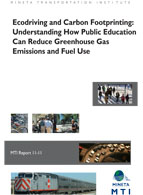- 408-924-7560
- mineta-institute@sjsu.edu
- Donate
Ecodriving and Carbon Footprinting: Understanding How Public Education Can Reduce Greenhouse Gas Emissions and Fuel Use
Ecodriving is a collection of changes to driving behavior and vehicle maintenance designed to impact fuel consumption and greenhouse gas (GHG) emissions in existing vehicles. Because of its promise to improve fuel economy within the existing fleet, ecodriving has gained increased attention in North America. One strategy to improve ecodriving is through public education with information on how to ecodrive. This report provides a review and study of ecodriving from several angles. The report offers a literature review of previous work and programs in ecodriving across the world. In addition, researchers completed interviews with experts in the field of public relations and public message campaigns to ascertain best practices for public campaigns. Further, the study also completed a set of focus groups evaluating consumer response to a series of websites that displayed ecodriving information. Finally, researchers conducted a set of surveys, including a controlled stated-response study conducted with approximately 100 University of California, Berkeley faculty, staff, and students, assessing the effectiveness of static ecodriving web-based information as well as an intercept clipboard survey in the San Francisco Bay Area. The stated-response study consisted of a comparison of the experimental and control groups. It found that exposure to ecodriving information influenced people’s driving behavior and some maintenance practices. The experimental group’s distributional shift was statistically significant, particularly for key practices including: lower highway cruising speed, driving behavior adjustment, and proper tire inflation. Within the experimental group (N = 51), fewer respondents significantly changed their maintenance practices (16%) than the majority that altered some driving practices (71%). This suggests intentionally altering driving behavior is easier than planning better maintenance practices. While it was evident that not everyone modifies their behavior as a result of reviewing the ecodriving website, even small shifts in behavior due to inexpensive information dissemination could be deemed cost effective in reducing fuel consumption and emissions.
SUSAN SHAHEEN PhD
Susan Shaheen is a lecturer in the Civil and Environmental Engineering Department and an associate research engineer with the Institute of Transportation Studies. She is also a co-director of the Transportation Sustainability Research Center. She served as the Policy & Behavioral Research Program leader at California Partners for Advanced Transit and Highways from 2003 to 2007, and as a special assistant to the Director’s Office of the California Department of Transportation from 2001 to 2004. In 2004, she became a research associate with the Mineta Transportation Institute. She has a PhD in ecology, focusing on technology management and the environmental aspects of transportation, from the University of California, Davis (1999) and an MS in public policy analysis from the University of Rochester (1990). She completed her post-doctoral studies on advanced public transportation systems at UC Berkeley in July 2001. She has earned a variety of honors, including two national research awards for her contributions to a carsharing pilot program (2001) and a smart parking field test (2005). In May 2007, she received the Berkeley Staff Assembly’s “Excellence in Management” award in recognition of her leadership and mentorship. She has co-edited one book and authored 42 journal articles and 64 reports and proceedings articles. She is an editorial board member of the International Journal of Sustainable Transportation. She was the chair of the Emerging and Innovative Public Transport and Technologies (AP020) Committee of the Transportation Research Board (2004 to 2011) and served as the founding chair of the Carsharing/Station Car TRB Subcommittee from 1999 to 2004.
ELLIOT W. MARTIN, PhD
Elliot William Martin is an Assistant Research Engineer at the Transportation Sustainability Research Center (TSRC) within the Institute of Transportation Studies at UC Berkeley. He holds a PhD in Civil and Environmental Engineering and a dual Masters in Transportation Engineering and City Planning, all from UC Berkeley. Previously, he worked as an Assistant Economist at the Federal Reserve Bank of Richmond. He graduated from Johns Hopkins University with a Bachelor’s degree in Economics and Computer Science.
RACHEL S. FINSON, MA
Rachel Satsuki Finson is a Project Manager at the Transportation Sustainability Research Center (TSRC) within the Institute of Transportation Studies at UC Berkeley. She has over twenty years of experience in the transportation arena, including issues pertaining to land-use, air quality, carbon emissions, transportation demand management, alternative fuels, and advanced technologies. Rachel received her MA in Environment, Technology, and Society from Clark University in Massachusetts. Prior to joining TSRC, Rachel managed the transportation program for the Energy Foundation. Rachel has extensive experience managing projects with diverse participants, coordinating multiple objectives and goals, and understanding obstacles to successful program implementation.
Rachel joined TSRC in 2002, to design and manage innovative mobility projects. Rachel’s interest in the transportation field is in bringing innovative ideas and technologies together in a manner that will reduce negative environmental impacts of transportation, while enhancing mobility options.
-
Contact Us
San José State University One Washington Square, San Jose, CA 95192 Phone: 408-924-7560 Email: mineta-institute@sjsu.edu






